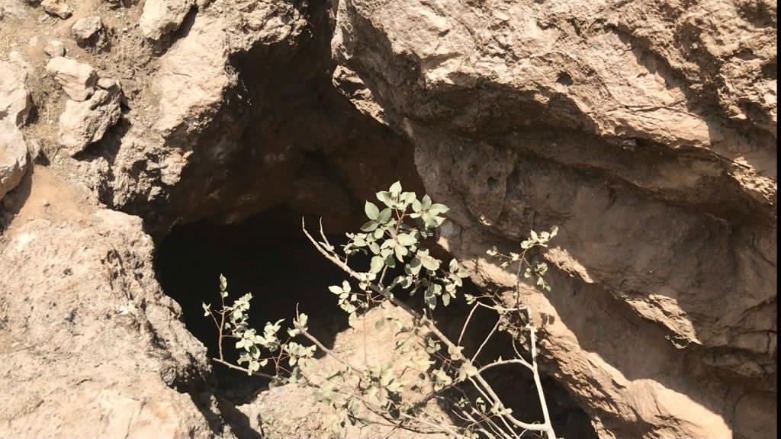Coalition and Kurdish forces conduct anti-ISIS operation in Iraq’s disputed Makhmour

ERBIL (Kurdistan 24) – A senior Peshmerga commander announced on Saturday that Kurdish forces conducted last Saturday a joint operation with the US-led Coalition against members of the so-called Islamic State southwest of the Kurdistan Region capital of Erbil.
The Peshmerga’s Gwer-Qarachokh Front Commander, Sirwan Barzani, said in a social media post that “a joint operation by #Peshmerga commandos & Coalition forces was conducted at Qerechukh mountain.”
A joint operation by #Peshmerga commandos & Coalition forces was conducted at Qerechukh mountain. 13 caves were searched and cleared during the 48-hour period of the operation. Such operations will continue to ensure that no hiding place is left for #ISIS terrorist in the area. pic.twitter.com/awo0I9UWrS
— Sirwan Barzani (@SirwanBarzani_) October 31, 2020
“13 caves were searched and cleared during the 48-hour period of the operation. Such operations will continue to ensure that no hiding place is left for #ISIS terrorist in the area.”
The commander did not clarify if any clashes with Islamic State fighters took place during the operation.
“In recent months the ISF [Iraqi Security Forces] and Peshmerga Forces have maintained a relentless rhythm of operations to disrupt Daesh, enabled by Coalition support, including tactical information sharing, intelligence, surveillance, reconnaissance and air power,” Wayne Marotto, the Spokesman for the US-led Coalition to defeat the Islamic State, told Kurdistan 24 on Saturday.
“The Coalition and our ISF partners are committed in our mission to defeat Daesh (ISIS) in designated areas of Iraq and Syria.”
The former British Consul General in Erbil, Martyn Warr, who now works for the Coalition to counter ISIS propaganda in London, stated in a tweet that the Islamic State has no more “hiding place.”
That’s it. No hiding place. #DefeatDaesh @SirwanBarzani_ @coalition @CJTFOIR @OIRSpox https://t.co/0ZZqEZMczi
— Martyn (@WarrMartyn) November 1, 2020
“It’s positive to see such collaboration between the ISF and Peshmerga against the common enemy, Da'esh (ISIS),” Warr told Kurdistan 24 on Monday. “The Coalition remains committed to supporting both forces to achieve the lasting defeat of Da'esh.”
On October 27, Sirwan Barzani also met Major General Kevin Copsey, Deputy Commander-Stability of the US-led anti-ISIS Coalition, and visited the Barzani memorial, Shanidar cave and other places and discussed ongoing operations against the Islamic State.
The town of Makhmour used to be jointly administered by the Kurdistan Regional Government and the federal government of Iraq since the fall of the Iraqi authoritarian regime in 2003.
Following the emergence of the Islamic State in 2014, throughout most of the disputed areas, the Kurdish Peshmerga forces held their frontline and prevented sleeper cells from entering their territory despite the terrorist organization controlling adjacent land.
Security in those regions, however, significantly deteriorated after Iraqi forces backed by Iranian-backed Shia militias, in response to the Kurdistan Region’s September 2017 independence referendum, overran Kirkuk and other disputed territories and drove Kurdish forces out.
One day after Iraqi forces took over Kirkuk, Peshmerga forces withdrew on October 17 2017 from Makhour and Gwer, towns south of Erbil.
After Shia militias entered Makhmour, Islamic State fighters returned close to Makhmour, threatening local villagers and farmers, over three years after Baghdad declared a military victory over the group in late 2017.
Read More: ISIS threatens to burn Makhmour farmers’ grain fields if they fail to pay ’taxes’
Last year, General Sirwan Barzani, told Kurdistan 24 that areas “under the control of Iraqi forces don’t have enough of a presence to prevent ISIS from accessing the Qarachukh mountain.”
In response to the Islamic State threats, the Peshmerga forces and Iraqi troops, backed by US-led Coalition airpower, have launched several military operations in recent years to eliminate sleeper cells hiding in areas surrounding Mount Qarachokh.
The Coalition, formally known as Combined Joint Task Force-Operation Inherent Resolve (CJTF-OIR), on Friday announced that they “conducted seven strikes against Daesh targets consisting of 16 engagements” in the time period between September 1 and September 30.
“This resulted in 18 enemy killed, six cache sites destroyed, and four tunnels destroyed.”
Nicholas Heras of the Institute for the Study of War told Kurdistan 24 that “ISIS continues to be a threat in the disputed internal regions of Iraq because there is a security vacuum in these regions.”
“The Iraqi Security Forces controlled by Baghdad are overstretched, riven with leadership disputes, and do not have a coherent plan for preventing the return of ISIS into areas that were once controlled by the Peshmerga and their adjutant intelligence networks.”
Editing by Khrush Najari
